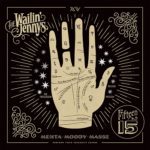 This was the first album I listened to on January 1 2018. Kind of appropriate really; after hearing so much beered-up musical stodge over the festive period, this is the perfect aural January detox to accompany the real thing. The Wailin’ Jennys (Heather Masse, Nicky Mehta and Ruth Moody) have been together fifteen years (hence the title), but this is their first album in six years. It’s worth waiting for; it’s gorgeous. They interpret nine very different songs but the common thread running through all of them is those three fabulous voices and the heartbreakingly pure harmonies. It’s possible I might mention that again at some point.
This was the first album I listened to on January 1 2018. Kind of appropriate really; after hearing so much beered-up musical stodge over the festive period, this is the perfect aural January detox to accompany the real thing. The Wailin’ Jennys (Heather Masse, Nicky Mehta and Ruth Moody) have been together fifteen years (hence the title), but this is their first album in six years. It’s worth waiting for; it’s gorgeous. They interpret nine very different songs but the common thread running through all of them is those three fabulous voices and the heartbreakingly pure harmonies. It’s possible I might mention that again at some point.
Everything is built around creating a setting for those flawless voices to deliver interpretations that are technically and emotionally perfect. Generally speaking, the musicians have a fairly light touch throughout the album; this is all about putting those three voices straight upfront and centre. When full string band arrangements are used, they tend to build up in layers to push the song to a higher level, which works particularly well on the timely cover of Tom Petty’s “Wildflowers” and the Jane Siberry song, “The Valley”. “Boulder to Birmingham”, Emmylou Harris and Bill Danoff’s plaintive elegy to Gram Parsons has a full band sound with some lovely two-guitar picking and percussive upright bass; none of it threatens to overwhelm the vocals.
For all the subtle and delicate playing, the a cappella or virtually a cappella material that really shines brightly. Paul Simon’s “Loves Me like a Rock” gets the handclap and fingerpop treatment, Dolly Parton’s “Light of a Clear Blue Morning” begins with a solo vocal before the stunning harmonies join, but the best is saved till last. The album’s final song is an a cappella cover of Hank Williams’ “Weary Blues from Waitin’” which not only has the expected beautiful three-part harmonies but features some incredibly precise three-part glissando harmonies. I have honestly never heard that done with such precision.
So now you’re going to ask if I like it, yeah? What a great way to start the year. But you don’t have to take my word for it; a click on any of those song links will take you to Spotify where you can hear it for yourself.
“Fifteen” is released on True North Records on Friday January 5 2018.
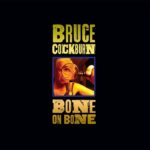 And yet another album from an artist with over fifty years of music-making, including thirty albums, behind him. “Bone on Bone” is his first album in six years and it’s a timely reminder of the quality of his acoustic playing and the depth of his songwriting. You wouldn’t say “Bone on Bone” was an easy listen lyrically; there are apocalyptic visions, environmental concerns and religious references alongside Bruce Cockburn’s robust and assured finger-picking. As good as the songs are, it’s his playing that stands out for me as he moves between standard acoustic, resonator and twelve-string acoustic, even including a guitar instrumental, the title track, finger-picked over a relentlessly repeated single note thumbed in the bass. And, as an interesting little aside for you, the lyric booklet is in English and French although only “Mon Chemin” is actually sung in French. If you know a bit of French, you can pick out subtle additional layers of meaning from the translations – the album’s opening song “States I’m In” translates literally as “My States of Soul”.
And yet another album from an artist with over fifty years of music-making, including thirty albums, behind him. “Bone on Bone” is his first album in six years and it’s a timely reminder of the quality of his acoustic playing and the depth of his songwriting. You wouldn’t say “Bone on Bone” was an easy listen lyrically; there are apocalyptic visions, environmental concerns and religious references alongside Bruce Cockburn’s robust and assured finger-picking. As good as the songs are, it’s his playing that stands out for me as he moves between standard acoustic, resonator and twelve-string acoustic, even including a guitar instrumental, the title track, finger-picked over a relentlessly repeated single note thumbed in the bass. And, as an interesting little aside for you, the lyric booklet is in English and French although only “Mon Chemin” is actually sung in French. If you know a bit of French, you can pick out subtle additional layers of meaning from the translations – the album’s opening song “States I’m In” translates literally as “My States of Soul”.
The album may be dominated by Bruce Cockburn’s acoustic playing, but that doesn’t mean that it’s predictable with styles ranging from the bluesy and slightly sardonic “Café Society” to the gospel feel of “Jesus Train” and the zydeco rockabilly of “Stab at Matter”. And it’s good to hear flugelhorn player Ron Miles adding some mellow brass voicings to the mix. What about the standouts? Well, “States I’m In” is difficult to beat with its almost-stream-of-consciousness lyrics stretching the song out to nearly six minutes, while “3 Al Purdys” is a vision of a manic street orator offering to recite three Al Purdy poems for twenty dollars.
The subject matter of the album is complex and, unlike our politicians on both sides of the pond, Bruce Cockburn doesn’t try to tell us that there are easy answers. There are lots of religious references, but these are much about the artist exploring his own relationship with his faith, rather than trying to sell a particular vision. “Bone on Bone” is a confident and mature album that doesn’t shy away from exploring complexity and resists easy paths. Recommended for anyone that’s happy to put in a bit of effort to get the most out of an album.
“Bone on Bone” is released in the UK on Friday September 15th on True North Records (TND678).
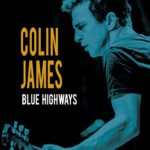 You get to the end of an extensive tour, your band have been taking the roof off every night, but now they’re world-weary and road-raddled; they just want to go home and spend time with their families, so what do you do? Well, you book a studio for a couple of days to catch them while they’re still hot and blast through some of your favourite old blues songs. Well, that’s what Canadian bluesman Colin James did, and the result is “Blue Highways”, recorded live in the studio in two days at the end of his last tour. It captures the raw energy of live performance with studio quality without compromising either side of that delicate balance.
You get to the end of an extensive tour, your band have been taking the roof off every night, but now they’re world-weary and road-raddled; they just want to go home and spend time with their families, so what do you do? Well, you book a studio for a couple of days to catch them while they’re still hot and blast through some of your favourite old blues songs. Well, that’s what Canadian bluesman Colin James did, and the result is “Blue Highways”, recorded live in the studio in two days at the end of his last tour. It captures the raw energy of live performance with studio quality without compromising either side of that delicate balance.
What about the material? Well, it’s thirteen of Colin’s favourite blues(ish) tunes covering a pretty good chunk of the blues canon, from the opener “Boogie Funk” (more boogie than funk, I think) with harmonica, Hammond, a simple electric riff and the classic guitar/Hammond solo interplay to the solo acoustic closer “Last Fair Deal”. It’s a pretty good demonstration of Colin’s feel for the whole blues spectrum. The Muddy Waters song “Gypsy Woman” evokes, well, Muddy Waters, as does the honky-tonk “Hoodoo Man Blues”, sounding like seventies McKinley Morganfield with his sidekicks James Cotton and Pinetop Perkins.
“Lonesome” is a jazzy uptempo shuffle with some lovely guitar fills and “Big Road Blues” is great fun with a slide riff and two lead guitars, but it’s when the band moves away from the standard blues that things get really interesting with the acoustic blues of “Last Fair Deal” and the harmonica-driven “Riding in the Moonlight”; the electric material’s good, but the acoustic songs really stand out. Finally, it’s a brave singer that takes on a song that’s been performed superbly by Otis Redding and William Bell in the past, but Colin’s slow soul take on “Don’t Miss Your Water” is a creditable effort, with a vocal that has hints of the UK’s own Aynsley Lister. It’s not breaking any new ground, but it’s a good demonstration of a band at the top of their game.
“Blue Highways” is released on True North Records of Friday November 25.
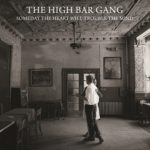 String bands, bluegrass generally; it’s not for everyone and I guess most bands making music in this genre today must be trying to attract a few new listeners, but how do you do it? You can try playing traditional tunes and be better than anyone else, but that’s not likely to bust you out of the genre. You can write new songs in the bluegrass idiom, but that’s risky unless they’re very good. The third way is to cover familiar songs in the string band style, and that’s the way The High Bar Gang have gone with their previous album of gospel songs and this album of heartbreak and death country songs. And they did one more revolutionary thing; they recorded the album in stereo, as opposed to using the traditional one–mic technique.
String bands, bluegrass generally; it’s not for everyone and I guess most bands making music in this genre today must be trying to attract a few new listeners, but how do you do it? You can try playing traditional tunes and be better than anyone else, but that’s not likely to bust you out of the genre. You can write new songs in the bluegrass idiom, but that’s risky unless they’re very good. The third way is to cover familiar songs in the string band style, and that’s the way The High Bar Gang have gone with their previous album of gospel songs and this album of heartbreak and death country songs. And they did one more revolutionary thing; they recorded the album in stereo, as opposed to using the traditional one–mic technique.
Despite a few lovely guitar solos, particularly on the opener, Dolly Parton’s “Silver Dagger” and the penultimate “Rock Salt and Nails”, the sound of The High Bar Gang is built on a solid basis of ensemble playing, the interplay between bass and guitar and the more percussive mandolin and banjo creating the rhythms that drive the songs underpinning a rich and varied series of textures and melodic settings created by seven players with various combinations of guitar, banjo, mandolin, fiddle and upright bass. There’s even some time signature variation, with almost half of the songs in ¾ time.
And then there’s the voices, working together in all sorts of combinations; two-part and three-part harmonies featuring in “How Many Times Have you Broken my Heart?” and “She’s More To Be Pitied” (sounding like a reply to the Arlie Carter and William Warren classic “Wild Side of Life”) and the male/female duet combination of “Branded Wherever I Go”. They all have that seemingly effortless lustre that only happens when a true gift is polished to perfection.
If you look at this as an experiment in adapting songs to a string band style, it’s a complete success; it should win over a few more fans to a genre that’s almost a polar opposite of everything we hear on mainstream radio. There are lovely interpretations of classic songs by Dolly Parton, Earl Scruggs, Roy Acuff, Hank Williams and Johnny Cash, all accented with perfect harmonies and melancholy fiddle fills. Who knows, it may even help them earn a well-deserved breakthrough to a wider audience.
“Someday the Heart Will Trouble the Mind” is out on August 19th on True North Records (TND622).
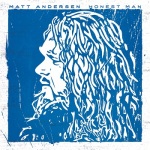 You barely make it past the intro of the album’s opener, “Break Away”, before it hits you; Matt Andersen has a phenomenal voice. It’s a rich baritone from the same mould as the great Paul Carrack and it’s the perfect vehicle for this set of songs harking back to the glory days of Stax and Atlantic. Matt’s previous work has been filed under blues, but there’s no doubt at all that this is a soul album (with a few detours into reggae rhythms and a hint of seventies rock). The album has a lot in common with last year’s Southside Johnny classic “Soultime!” in that they’re both inspired by the glory days of sweet soul music; you can find little references to all sorts of artists and styles throughout the album, but it’s ultimately held together by that superb voice.
You barely make it past the intro of the album’s opener, “Break Away”, before it hits you; Matt Andersen has a phenomenal voice. It’s a rich baritone from the same mould as the great Paul Carrack and it’s the perfect vehicle for this set of songs harking back to the glory days of Stax and Atlantic. Matt’s previous work has been filed under blues, but there’s no doubt at all that this is a soul album (with a few detours into reggae rhythms and a hint of seventies rock). The album has a lot in common with last year’s Southside Johnny classic “Soultime!” in that they’re both inspired by the glory days of sweet soul music; you can find little references to all sorts of artists and styles throughout the album, but it’s ultimately held together by that superb voice.
The album opens with the Hammond-led gentle reggae feel of “Break Away” which hints at “Graceland”-era Paul Simon and The Staples’ “Come Go with Me”, moves into the slow and subtle soul of “The Gift” with its beautiful cascading guitar before the title track throws a whole bunch of influences into the blender. “Honest Man” opens with a riff that’s not a million miles from “Crossroads”, develops with some Memphis Horns-style brass (including the trademark rasping baritone sax) and drops into a chorus with backing vocals which could have been inspired by Don Henley’s scathing “Dirty Laundry”.
So, you get the picture; the album pulls dozens of influences into the blend without ever sounding derivative. “All the Way”, with its hint of a reggae beat, languorous vocal and wah-wah guitar has a hint of seventies Clapton, “Last Surrender” has echoes of Sam Cooke and “Who Are You Listening To?” suggests late seventies Bob Seger, both musically and lyrically. It’s a celebration of some of the classic stylings from our musical history combined with a bunch of well-constructed contemporary songs.
There are a few political and social references, but the songs cover a variety of lyrical themes including love and friendship. “I’m Giving In” is a haunting piano ballad with an intimate, late night vocal while the album’s closer, “One Good Song”, describes the things that a songwriter would suffer to create the one song that makes an audience stop and listen. It’s fair to say that he’s done that a couple of times on this album with the title track and “Last Surrender”. “Honest Man” is a joyous piece of work placing a superb soul voice in settings which demonstrate its quality to perfect effect.
“Honest Man” is released on True North Records (TND612) on April 1st.
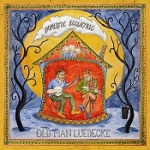 For “Domestic Eccentric”, Old Man Luedecke has teamed up with multi-instrumentalist Tim O’Brien to produce an intimate, home-recorded set of songs covering a wide variety of themes and styles. The songs are very, very good (actually, a couple are excellent), the performances are spot on and there’s a really effective mix of traditional bluegrass playing and vocal harmonies with modern lyrical ideas. The inspiration for most of these songs comes from his life as a young parent and the idea of recording almost everything in the home setting creates a very intimate feel.
For “Domestic Eccentric”, Old Man Luedecke has teamed up with multi-instrumentalist Tim O’Brien to produce an intimate, home-recorded set of songs covering a wide variety of themes and styles. The songs are very, very good (actually, a couple are excellent), the performances are spot on and there’s a really effective mix of traditional bluegrass playing and vocal harmonies with modern lyrical ideas. The inspiration for most of these songs comes from his life as a young parent and the idea of recording almost everything in the home setting creates a very intimate feel.
“The Briar and the Rose” (sounding a little like early Jackson Browne with a banjo), “The Early Days”, “Chester Boat Song” and “Now We Got a Kitchen” all give a slightly different slant on settling into a family life, while “Hate What I Say” and “Happy Ever After” seem to belong to a slightly different pre-domestic bliss era. Luedecke likes to bring a poetic sensibility to his lyrics, indulging in wordplay and the fusion of incongruous ideas, which is great when it works well: ‘If it rained forty days and it rained forty nights, Would you be my plus one if we could find the ark?’ (“Wait a While”), but sounds a bit clunky on the opening song, “Yodelady”.
“Domestic Eccentric” is a long way from being a bad album, but the sublime moments are the domestic ones and the eccentricity stops the album from achieving greatness. It’s difficult to maintain the intensity of the personal, autobiographical songs over a whole album and the unconvincing moments on this album tend to come when the mood lightens; the album wouldn’t suffer significantly if the opening song and “Real Wet Wood” (despite the great half-line ‘better to burn out than explode’) were both removed to bring it down to twelve songs, making “The Girl in the Pearl Earring” the opening song.
The album does have some truly great moments and you really should give it a listen.
“Domestic Eccentric” is out now on True North Records (TND 605).


